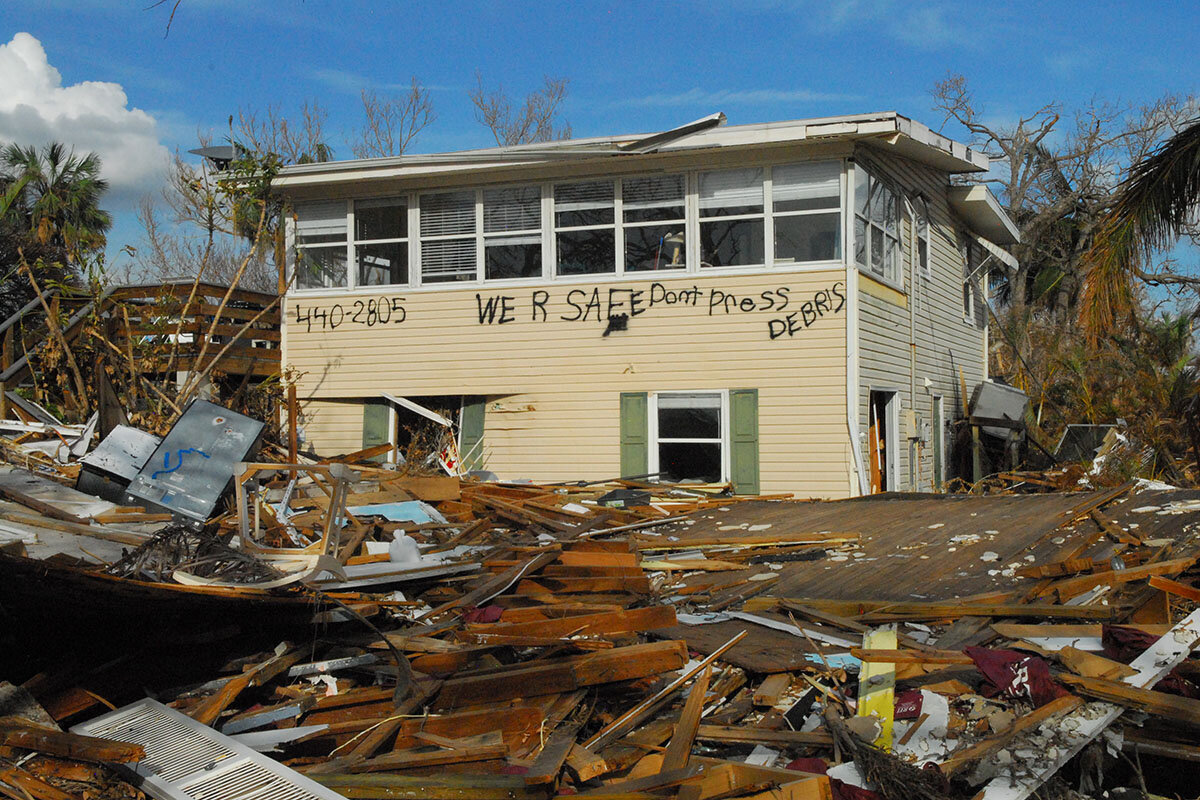The storm has passed. For thousands in Florida, the displacement lingers.
Loading...
| FORT MYERS AND FORT MYERS BEACH, FLA.
Southwest Florida isn’t what it used to be to Brittany Ward.
She grew up in Cape Coral, a canal-filled city just across the Caloosahatchee River from Fort Myers. It had a small town feel, she says. There were skating rinks, beaches, and parks, she says. Always something to do.
By the time she became a mom, the town had grown crowded and prices had risen. The skating rinks closed. Her five kids had more fun inside anyway. But there were still beaches and barrier islands for the weekends. There was still the yacht club – the same one Ms. Ward visited as a kid.
Why We Wrote This
Many in southwest Florida need new places to live after Hurricane Ian. Federal and local aid gives a boost, but people are grappling with difficult choices.
Hurricane Ian took that away.
Wind and storm surge swept through the area, taking almost everything that – to Ms. Ward – made Cape Coral Cape Coral. The yacht club was destroyed. Bridges to the nearby barrier islands collapsed. “Our own beach is gone,” she says. “It’s gone”
Her home is too, almost. Her rental already had a crack in the roof before the storm. The storm split it into seven more. With other damage, it wasn’t habitable. Ms. Ward, who spoke to the Monitor briefly in person and again later by phone, drove her kids to Orlando and back multiple days for an available hotel. Then for a time they bunked near the damaged home with her sister, who has a husband and three kids. As of Oct. 9, Ms. Ward was looking for a new rental. Her landlord told her it would take weeks to repair the old one.
Ms. Ward is one of the thousands of Floridians displaced after the area was all but annihilated by Hurricane Ian, . The hurricane caused , including to thousands of homes. And while the area hosts many snowbirds and second-home owners, some of its permanent residents have now become temporary refugees – relying on the help of their own community while also .
Some stay in hotels, though it’s difficult to find vacancies. Some stay with family or friends. Some camp out in tents or mobile homes or trailers. Many face lengthy waits before their homes are rebuilt or repaired. Some, like Ms. Ward, are searching for somewhere new.
“I feel like if I don’t go now, with this, something worse could happen,” she says.
As of Tuesday, the Federal Emergency Management Agency is supporting 1,468 Florida households – 3,817 people – through its , says Renee Bafalis, a FEMA spokesperson. In addition, the agency has opened 15 disaster recovery centers, where Floridians can speak with representatives and apply for aid. The Red Cross and its partners have affected by the hurricane.
An escape, and a hard recovery
Two days before the storm, Ms. Ward and her children squeezed into her Chevy Malibu and drove to the Red Roof Inn in Orlando. It was the closest hotel she could find, still three hours and four minutes away.
Even where they were, she says, the storm was “petrifying.” As it passed, she began to see images of the damage. So many of the places she would take her kids were being destroyed.
But they were safe, and soon after the hurricane ended she drove back down to assess the damage. She photographed the cracks in the roof – some in the living room, some in her kids’ bedrooms. All this she sent to her landlord, she says, who wasn’t responding to her.
The next week, the family drove back and forth from Orlando, so Ms. Ward could do her job at a permitting office. Her kids, age 8 and 14, joined her.
It was a relief when her rental’s power was restored. Ms. Ward drove over and began to clean up. But a burst water heater, coupled with a septic backup that left an unbearable stench, displaced her again.
Still, Ms. Ward has been getting meals for neighbors, friends, and family at the local food bank – where she’s been going at lunchtime.
Aid like that has become common around the area – from hard-to-reach islands just off the coast to Walmart parking lots, where displaced people are camping out in RVs and tents.
Since the hurricane, Ramon Martinez has been living in a single-person tent next to the Walmart where he works. He was staying in a shelter before the storm, but it wasn’t safe for a hurricane, and he had to move from place to place before getting an offer to stay an hour away. He couldn’t take it, he says, wearing a khaki hat and T-shirt as cars pass behind him. It was too far from his job.
Relief stations: Bridge to an uncertain future
Aid stations providing food, water, showers, and laundry have followed people’s needs, serving hundreds a day in different locations.
Those services helped Kitty Achors get through last week.
Ms. Achors is a 16-year resident of Siesta Bay, a neighborhood that suffered some of the worst losses – including a few lives – during the hurricane. She left just before the storm for an inland hotel, only to lose her room after a few days because emergency workers needed a place to stay.
Her son Greg drove down from Jacksonville as soon as I-75 opened, and they both went back together. There was nowhere else to go, she says.
They came back about a week later with Mr. Achors’ blue GMC Sierra and a rented mobile home hitched to the back. Her home is completely destroyed. More than six feet of water surged inside, warping the walls, flipping the king size bed, and dragging her front porch across the street.
Ms. Achors and her son parked their trailer in front of a restaurant near San Carlos Boulevard. The Walmart across the street closed its lot to anyone staying overnight, but has become a hub for different aid stations during the day.
The Achors met with a FEMA representative after waiting on hold several hours three days in a row. The federal response, to them, feels disorganized. Her house wasn’t insured anyway, and they expect the neighborhood to be condemned. As of Oct. 11, they were going back to Jacksonville – and for Ms. Achors, soon, even farther away.
She has family and a place to stay in Indiana, she says. “I just like Florida. I don’t like Indiana winter,” she says. “Now I’m going to have to learn to like it.”
Leaving a life in Florida behind?
Ms. Ward has also set her eyes out of state. Waiting to hear back about another rental, which she could move into immediately, she described her dream to move to North Carolina.
She’s visited a couple times to see friends, and spent part of her time in the Orlando hotel applying for jobs in the state. Taking care of family has, in part, kept her down south her entire life. She felt like she didn’t have a choice to leave before. Now she does.
She says she hasn’t heard back on any jobs yet. But the schools there are good, there are mountains, and there’s a better life for her children, perhaps.
“They have seasons,” says Ms. Ward. “That’s my biggest thing – I’ve always wanted my kids to have seasons”









